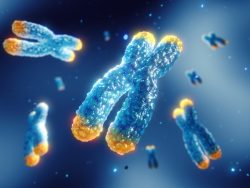 Recent research is unraveling the relationship between our diet and our biological age, as measured by the length of our telomeres. These tiny caps on the end of our chromosomes are believed to serve as a reliable indicator of aging and the risk of age-related diseases. Your choices at the dinner table could potentially influence your well-being and longevity. Could this knowledge change the way you think about reaching for that bag of chips?
Recent research is unraveling the relationship between our diet and our biological age, as measured by the length of our telomeres. These tiny caps on the end of our chromosomes are believed to serve as a reliable indicator of aging and the risk of age-related diseases. Your choices at the dinner table could potentially influence your well-being and longevity. Could this knowledge change the way you think about reaching for that bag of chips?
Telomeres are structures that cap our chromosomes, safeguarding our genetic material from damage during replication. But here’s the catch – every time a cell divides, telomeres get shorter, accelerating the aging process. As telomeres shrink, so does the cell’s lifespan until it eventually reaches its demise. It’s been found that shortened telomeres heighten the risk of serious health issues like cardiovascular diseases, cancer, and metabolic conditions.
Why do some people’s telomeres shorten faster than others? Scientists have been on a quest for answers. Recent studies show that factors like smoking, alcohol, stress, lack of exercise, obesity, and poor diet can also accelerate this process.
Participants in the study followed a diet rich in whole foods, plant-based protein, vegetables, fruits, unrefined grains, and legumes. They also consumed minimal fat and refined carbohydrates.
The results were astounding: at the end of the five-year follow-up, the control group showed the expected telomere shortening, but the lifestyle intervention group actually experienced an increase in telomere length.
The study aimed to investigate whether diet-associated inflammation could affect the rate of telomere shortening after five years. The analysis revealed that diets with more anti-inflammatory potential were able to slow down the process of telomere shortening. Moreover, participants who followed a more inflammatory diet had nearly double the risk of accelerated telomere shortening compared to those who followed an anti-inflammatory diet.
These findings provide promising evidence that our diet choices can have a significant impact on the aging process. By choosing an anti-inflammatory diet, we may be able to slow down the signs of aging and promote longevity.
To view the original scientific study click below:
Dietary inflammatory index and telomere length in subjects with a high cardiovascular disease risk from the PREDIMED-NAVARRA study: cross-sectional and longitudinal analyses over 5 y





